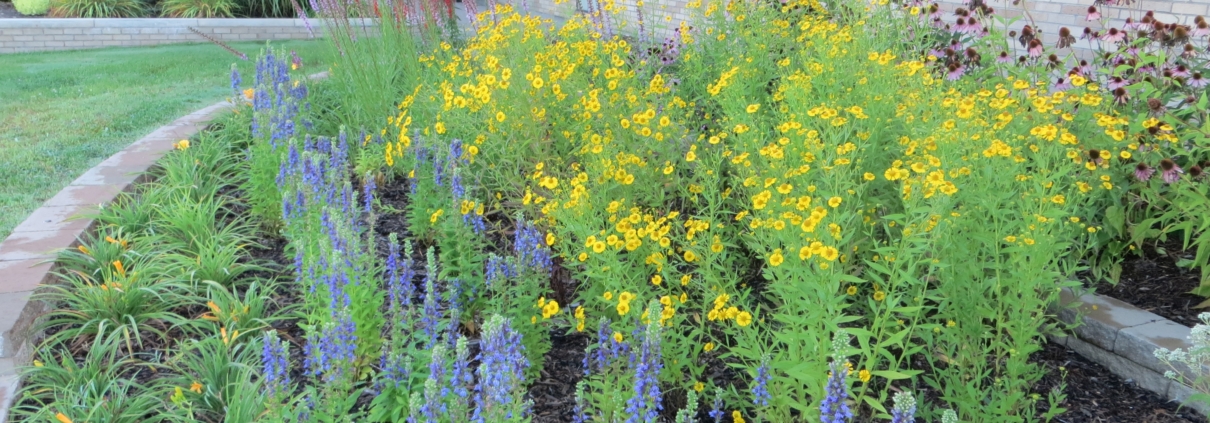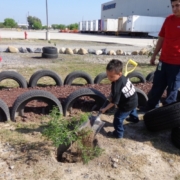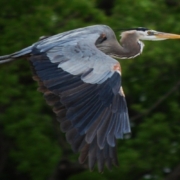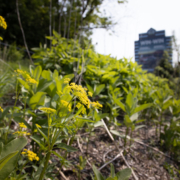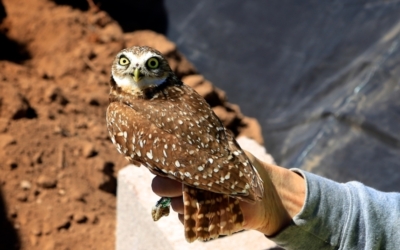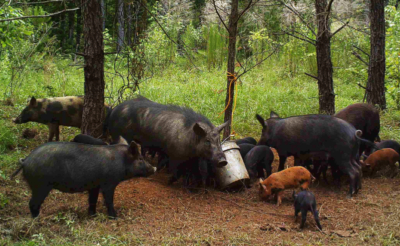ITC | A Wildlife-Friendly Rain Garden to Manage Stormwater Runoff Charms Employees and Partners Alike
En Español
Managing stormwater runoff can prove to be a significant challenge for sites in urban areas and other highly-developed locations. It causes problems with flooding, erosion, and water quality, as well as a multitude of indirect impacts associated with these issues. Green infrastructure projects like rain gardens are becoming increasingly embraced as a way to help alleviate stormwater runoff impacts at corporate facilities while also improving site aesthetics and providing habitat.
Faced with issues from erosion caused by excessive runoff, employees at ITC Holdings’ Wayland Warehouse constructed a rain garden in 2012. The garden is designed to intercept and absorb several thousand gallons of runoff from the warehouse’s roof during a rainstorm—water that would otherwise flow across the lawn and into the parking lot. The team sought the expertise of Environmental Consulting & Technology (ECT) for help with designing the garden and selecting a variety of pollinator-friendly native plants that tolerate the fluctuating conditions of a rain garden. Another contractor, MJA Landscaping, conducts routine maintenance and monitoring of the garden and, according to ITC Environmental Manager Mike McNulty, both contractors and employees genuinely enjoy these activities and “really take pride in the rain garden.”
The rain garden is designed to capture thousands of gallons of stormwater runoff from the warehouse roof and provides foraging and nesting habitat for native pollinators and songbirds.
This is the third rain garden installed at an ITC facility and was the first project implemented at the Wayland Warehouse. The team has partnered with another facility, Belleville Warehouse, to reach out to community groups through educational workshops about the sites’ rain gardens. They also hosted a workshop about nest boxes for students at the Child Discovery Center in Grand Rapids.
In 2016, because of the success of the rain garden and employees’ enthusiasm for it, the team planted an adjacent 1,200-square-foot upland garden as an expansion. The rain garden has also been enhanced with tube bundles to provide nesting habitat for native bees, and a nest box to provide nesting habitat for wrens and chickadees.
While small in scale, the Wayland Warehouse conservation program provides a valuable island of habitat in an area dominated by the hallmarks of urban development — non-native turf grass lawns, buildings, gravel and pavement, and ornamental hedges. In fact, butterflies, bees and songbirds have all been observed in the garden area since its installation. In addition, the small scale of the program has allowed the team to focus its time and energy on ensuring its success. As McNulty described, “It’s a small enough, focused project that we could devote time and effort to it.”
The Wayland Warehouse team has successfully implemented a focused, comprehensive program, and to reward these efforts, the team was awarded the 2016 WHC Green Infrastructure Project Award.
Related Content
- Blogs
- Webinars:
- Project Guidances:
- White Papers:
Quick Facts
| Site Name: | Wayland Warehouse |
|---|---|
| Category: | Member Spotlight |
| Tags: | green infrastructure, landscaping, Resources Success Stories Pollinators |
| Site Location: | Wayland, Michigan |
| Partners: | Child Discovery Center, Environmental Consulting & Technology, Inc. (ECT), MJA Landscaping, Woodcraft Kits |
| Certification Since: | 2014 |
| WHC Index Link: | Learn more about the program |
